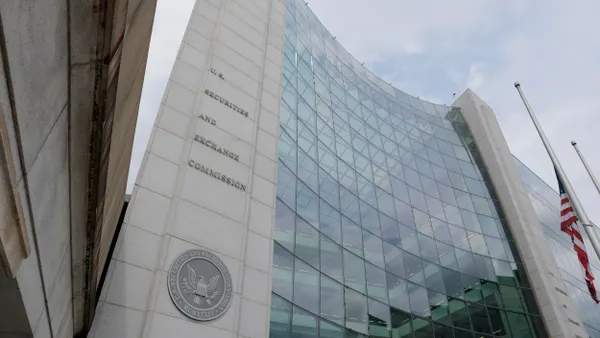Dive Brief:
- The top Democrat and a former Republican chairman on the Senate Finance Committee introduced legislation to bolster an Internal Revenue Service (IRS) whistleblower program that has netted $6 billion from companies and wealthy individuals caught dodging taxes.
-
Legislation sponsored by Sens. Ron Wyden (D-Ore.), committee chairman, and Chuck Grassley (R-Iowa) would help trim a $630 billion annual gap in taxes owed and taxes paid with seven measures encouraging whistleblowers, including a presumption of anonymity before the court.
- Referring to the whistleblower program, Grassley said, “we ought to do whatever we can to ensure its continued success, so that tax dodgers and fraudsters pay what they owe,” adding “it’s vital that whistleblowers who come forward are protected and treated fairly.”
Dive Insight:
The Biden administration last month proposed a 10.4% increase in the outlay for the IRS for fiscal year 2022 to $13.2 billion, including an increase in the budget for enforcement focused primarily on corporations and wealthy taxpayers. Every $1 spent on enforcement yields at least $4 in direct revenue, according to the IRS.
The IRS budget has shrunk by about 20% during the past decade, prompting a decline in the number of specialized auditors and other critical staff and increasing the tax gap, the Treasury Department said in a plan released last month.
The IRS has fewer auditors today than at any time since World War II, the Treasury said, adding that the share of all corporate returns audited fell 37% from 2010 until 2018. The share of returns audited from corporations with assets exceeding $20 billion plunged by 50%.
The bill proposed by Wyden and Grassley would exempt whistleblower awards from budget sequestration, ensure interest is paid to whistleblowers if their award has not been paid within one year and align the tax treatment for attorney’s fees with other whistleblower programs.
The legislation also would upgrade the program’s annual report to Congress to help lawmakers determine priorities for tax writing, permit the admission of new evidence in appeals heard by the U.S. tax court and allow the IRS to retain some proceeds for the administration of the whistleblower program.
“IRS whistleblowers play a critical role protecting taxpayer dollars and finding tax cheats stealing from the American people,” Wyden said in a statement. “Our bill would strengthen protections for these brave Americans when they come forward.”
Outside the U.S., companies that operate across borders face growing scrutiny and audits driven in part by the base erosion and profit sharing (BEPS) project of the Organization for Economic Cooperation and Development (OECD).
The project, launched in 2013, has gained momentum from an increased focus by the media and governments on the success by some companies in reducing their taxes by moving operations and reporting to lower-tax countries.















